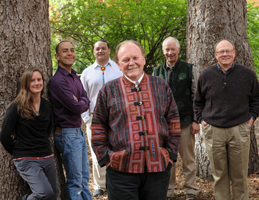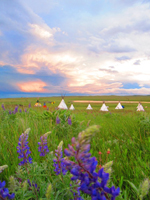Native Language and Learning Environmental Science in Contrasting Mountain Systems
This post was co-written by Michael Brody, Christine Rogers Stanton, and Art Bangert, Department of Education, College of Education, Health and Human Development, Montana State University, Bozeman, Montana, USA; Shane Doyle, Native American Studies Program; and Cliff Montagne, Department of Land Resources and Environmental Science, Montana State University, Bozeman, Montana, USA; and Natalia Yurkova, Gorno-Altaisk State University, Gorno-Altaisk, Altai Republic, Russian Federation.
Background on Indigenous Populations and STEM
Indigenous populations are often underrepresented in STEM careers, and in the US and Russia, there is currently a focus on enabling such groups to become successful in these areas. The importance of understanding and using indigenous language in both formal and informal settings to promote science learning amongst native audiences [1] is increasingly recognized and considered an effective way to expand success in STEM.
At Montana State University (MSU), a National Science Foundation (NSF)-funded project is currently underway to study science learning and plan education activities within Indigenous communities in two distinct, but similar mountain systems: the Yellowstone Mountain Region in the US and the mountains of the Altai Republic in Russia. This project is a direct outcome of an international planning workshop grant from NSF (OISE/ISE 1016120) that supported faculty and student travel in the Altai Region from 2011-2013. The report from the planning grant is available on the project's website.
The current research project, Native Language and Learning Environmental Science in Contrasting Mountain Systems (OISE-1261160) will be conducted from 2013-2016. The project will include three summer expeditions in the Altai and three seasons of field research in the Yellowstone Ecosystem. The project is a collaboration between MSU and the Gorno-Altaisk State University (GASU) in Russia, and engages educators and environmental scientists as well as experts in Native American and Altai language, history, and ecology.

The project team.
Specialists from different fields will contribute to the project from both the American and Russian teams. The GASU team is led by Dr. Natalia Yurkova and includes: Dr. Surna Sarbasheva, who is an Altai native and teaches the Altai language and literature to university students; Professor Maria Sukhova, who works with native people to learn how climate change and its consequences influence their traditional land use; and Dr. Alexander Ebel, a specialist in the Altaian history and culture, who has experience working with and teaching native people by involving them in a variety of archaeological research projects.
At MSU, the team includes: Dr. Shane Doyle, a member of the Crow Tribe who has worked with tribal colleges within the Montana Indian reservations; Dr. Christine Rogers Stanton, assistant education professor and a co-principal investigator of the NSF grant; Dr. Art Bangert, an associate professor of educational leadership whose primary research interest is focused on online learning; and Dr. Cliff Montagne from the faculty of environmental science.
Fostering Cross-Cultural Collaboration to Enhance Indigenous Participation in STEM
The project will investigate the use of native language for environmental science learning from three different perspectives: people, place, and culture. The people-centered perspective studies psychological phenomena relevant to informal science learning such as interests, motivation, knowledge, skills, dispositions, identity, prior knowledge, expert-novice understanding, and metacognition. The place-centered perspective looks at what happens across and within particular places such as physical features, biological communities, available resources, and local activities associated with specific places that influence learning and decision making. From the culture-centered perspective, the integration of knowledge from experiences across settings and time will be considered, with an aim of maximizing the ecological connections among learning experiences including afterschool programs, museums, kitchen gardens, family excursions, traditional ceremonies, parks, trails, and other related informal learning experiences.
The Altai team is informed by a traditional approach to ethnocultural teaching and learning, which integrates local and regional ethnicity and cultural factors in the interdisciplinary learning of school subjects. The US team is influenced by the theory of pedagogical content knowledge [2], which is specialized knowledge within a domain that makes the teaching and learning of subject matter more meaningful and effective. In this project we combine the theoretical underpinnings from each of the teams to scaffold an ethnocultural pedagogical content knowledge approach that lends to cross-cultural collaboration of distinct yet complimentary theories and perspectives on learning.
Current Progress and Strategies for Addressing Challenges

Teepees in a mountain system.
Qualitative and quantitative data collection, through video interviews, journal entries and field notes, has been occurring at all stages of the project and as part of a formative evaluation conducted internally by Dr. Bangert. Results from the project's workshops so far indicate that native language use in both Yellowstone and Altai mountain systems is critical to maintaining cultural identity. There are unique meanings embedded in native language that can only describe the particular natural phenomena being observed and communicated. Although the results are specific to native populations in the Yellowstone and Altai mountain systems, our project team believes the findings could inform methodological approaches to investigating native language use and science learning with other indigenous populations.
While each situation under investigation is likely to be unique, by comparing the similarities and differences between language groups and developing a pattern of culturally appropriate and effective data acquisition methods, the team will help inform a responsive research methodology. If ethnocultural pedagogical content knowledge actually appears within the use of native language and informal science learning, we believe that the learning concepts, principles, and methodologies we generate will be transferrable across disparate groups of underrepresented audiences in science education. We recognize that this type of methodological innovation puts great demands on the researchers and participants. It is difficult for educational researchers like us to question our epistemological orientation and experiences because we work within the existing academic and research communities. However, these innovations provide the opportunity to rethink, reconceptualize, and recreate insightful and useful research results and conclusions.
Future Research and Next Steps
Ultimately, outcomes from the project will contribute to improving understanding of informal and formal science learning, natural and cultural resource management, and social and ecological sustainability. By understanding how, why, and where learning takes place, US and international research and education agendas can be extended. As the team proceeds with our research, we will assess our results annually, eventually combining them into native language resources for learning that will be encyclopaedic in nature and used in science education programs in the future. We are interested in providing support for underrepresented populations to be successful in STEM. There is very little available to help educators and learners bridge the subject of science with native language and indigenous knowledge. Our goal is that our research project will create new knowledge for educators to reference and use when working with native people in a variety of contexts. Results will be disseminated to the wider field through a presentation at the North American Association for Environmental Education Research Symposium, peer-reviewed articles and other dissemination resources such as the informalscience.org website.
[1] Brody, M., Bangert, A., & Dillon, J. (2007). Assessing learning in informal science contexts. (Commissioned Paper). Washington, DC: National Research Council. [2] Shulman, L. (1985). Pedagogical Content Knowledge. (Available at: http://www.leeshulman.net/domains/)